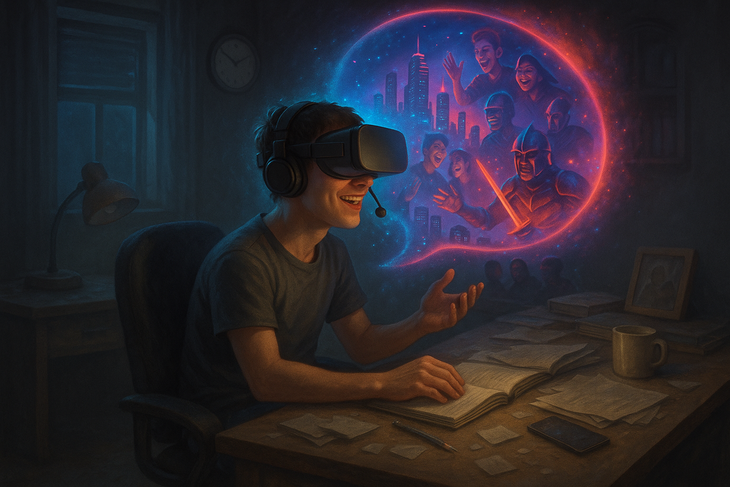
When the Virtual World Touches the Mind: The Metaverse and Mental Health
The Metaverse is more than just a game or a tech app, it's a parallel world where you control an avatar to learn, work, or adventure through virtual reality (VR), augmented reality (AR), or mixed reality (MR).
What do you get from the Metaverse virtual universe?
You can meet with your colleagues in Tokyo in a virtual office, take a class on Mars, or fight dragons in an RPG. But don't let the vividness fool you! Our brains sometimes confuse reality with fantasy, so emotions like joy, stress, or sadness in the Metaverse can haunt you even after you take off your VR headset.
The Metaverse affects many groups of people. Students are easily drawn into VR games or virtual learning platforms, facing the risk of "addiction" and disconnection from real life.
Remote workers, despite staying “connected” through virtual meetings, often feel lonely or isolated. Long-term VR gamers may experience circadian rhythm disruption or feel empty when returning to reality.
Conversely, the Metaverse can also help psychological patients, with VR therapies helping to overcome acrophobia, depression, or post-traumatic stress disorder (PTSD).
The effects of the Metaverse aren’t immediate. After a few weeks of immersion, you may find yourself having trouble focusing on real work, losing sleep because you’re “living” in VR, or feeling lost without your avatar.
Some people are also anxious about the burden of constructing an ideal virtual self — from flawless skin to confident communication style.
According to a medRxiv survey (2024), 30% of regular VR users reported feeling “empty” when returning to real life, especially in the 15-25 age group.
Conquer the Metaverse without losing yourself
The Metaverse is a mind-bending drug. It gives you the freedom to be anyone, do anything, from flying through the sky to owning a virtual million-dollar mansion. But that excitement is a double-edged sword.
When the virtual world is too alluring, the real world becomes dull. The pressure to maintain a perfect image in the Metaverse can also exacerbate anxiety, low self-esteem, or even depression.
To protect your mental health, limit VR or Metaverse use, especially for children. Balance the virtual and real worlds by prioritizing seeing friends and family in real life.
If you feel lost, sad, or stressed for a long time, seek help from a mental health professional. More importantly, see the Metaverse as a tool for learning and exploration , rather than a place to escape from reality.
The human mind is fragile, and spending too much time in a virtual world can easily lead to a disconnection from yourself. Approach the Metaverse with awareness and responsibility, so that it becomes a key to new experiences, rather than a door to a break from reality.
Source: https://tuoitre.vn/metaverse-va-cach-bao-ve-suc-khoe-tam-ly-trong-the-gioi-ao-20250529104917451.htm






![[Photo] Prime Minister Pham Minh Chinh attends the event "Digital transformation of the banking industry by 2025"](https://vphoto.vietnam.vn/thumb/1200x675/vietnam/resource/IMAGE/2025/5/29/0e34cc7261d74e26b7f87cadff763eae)




















![[Photo] Prime Minister Pham Minh Chinh receives leaders of Excelerate Energy Group](https://vphoto.vietnam.vn/thumb/1200x675/vietnam/resource/IMAGE/2025/5/29/c1fbe073230443d0a5aae0bc264d07fe)































































Comment (0)